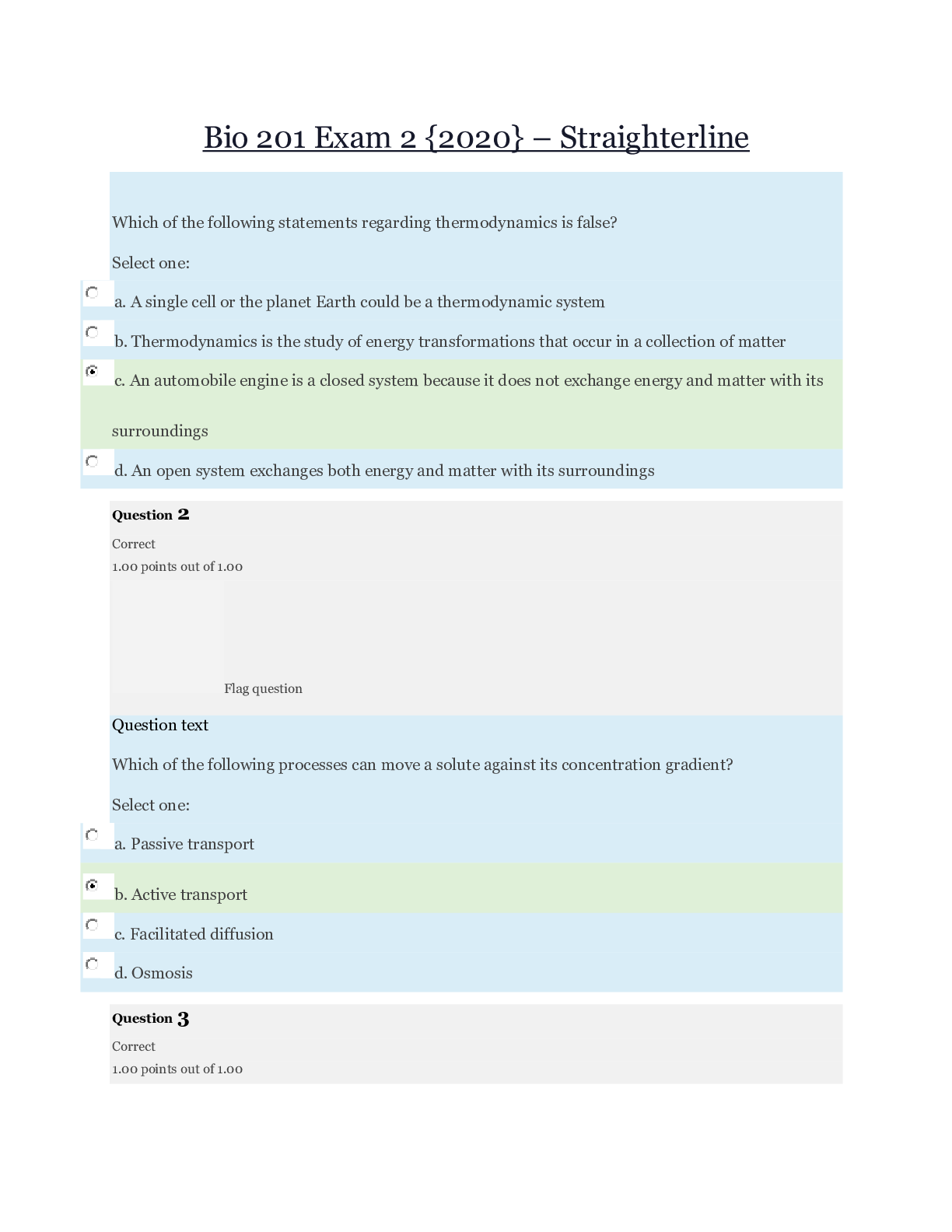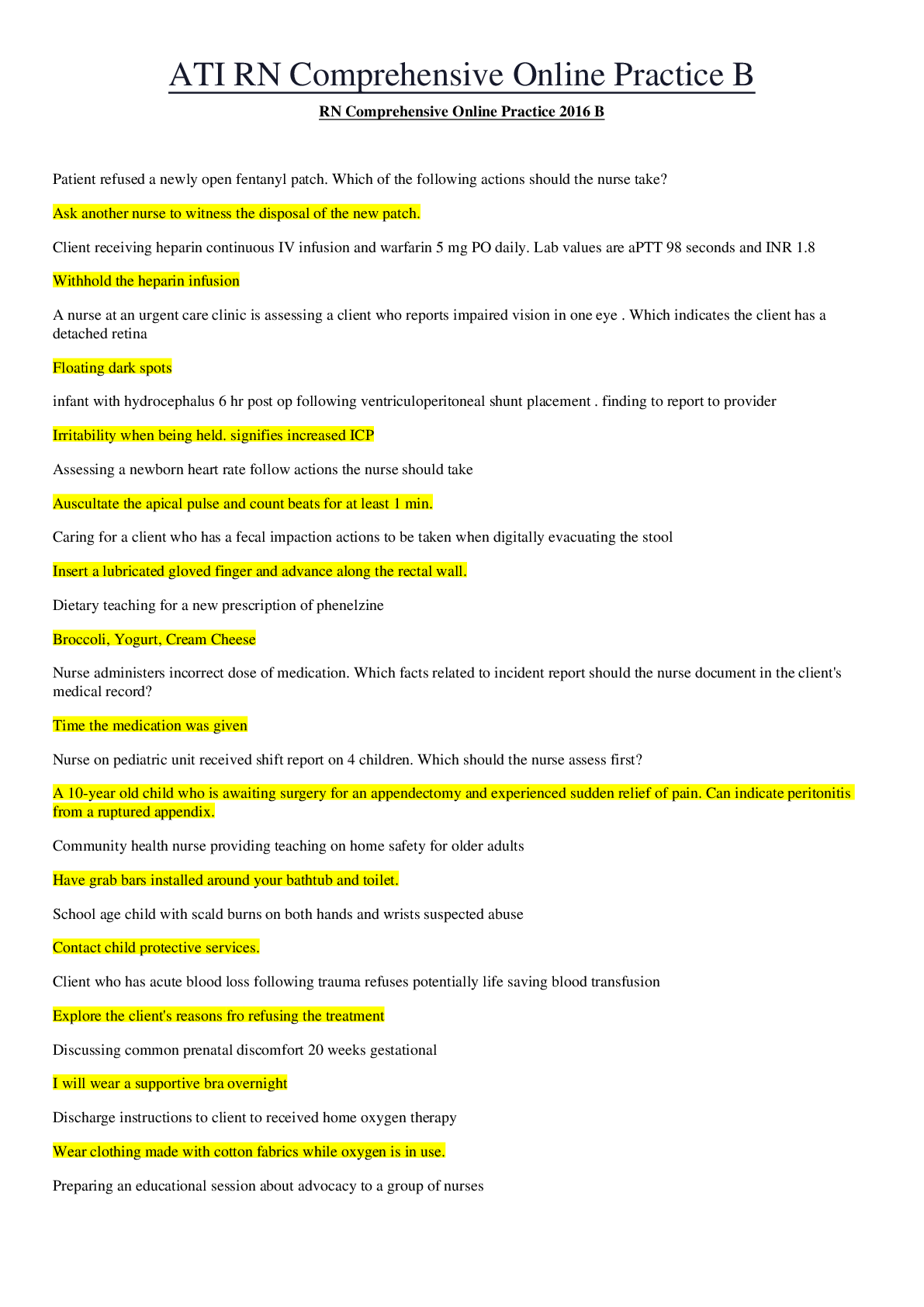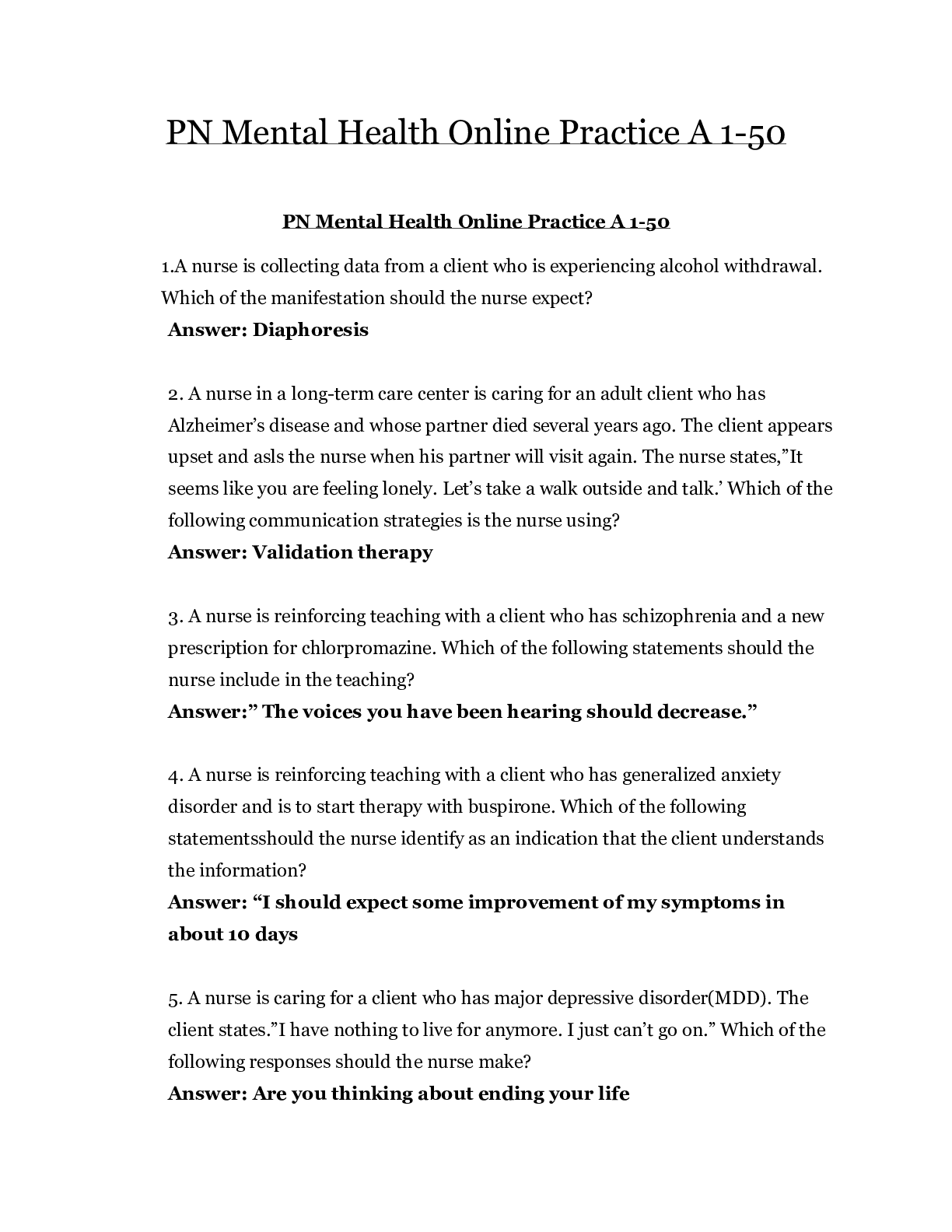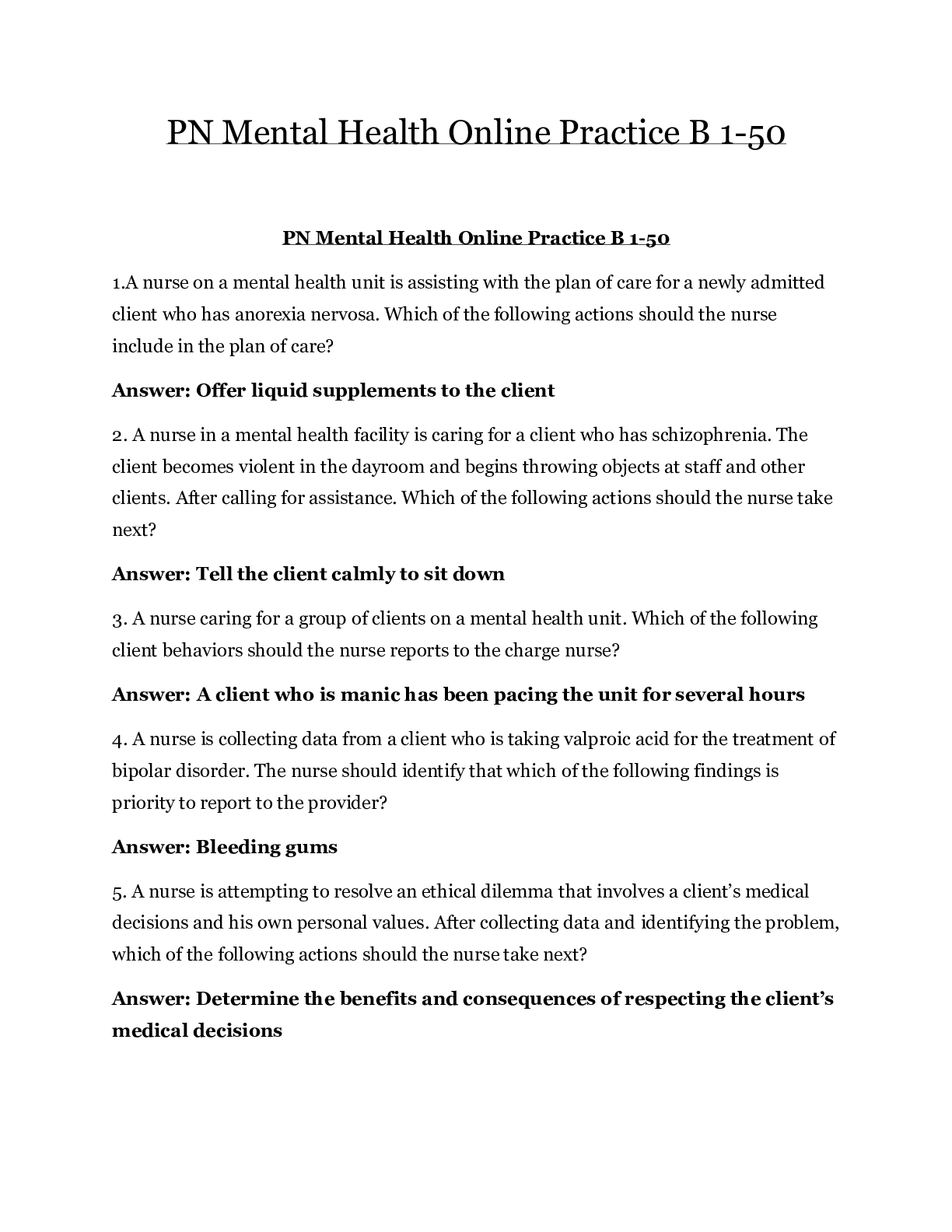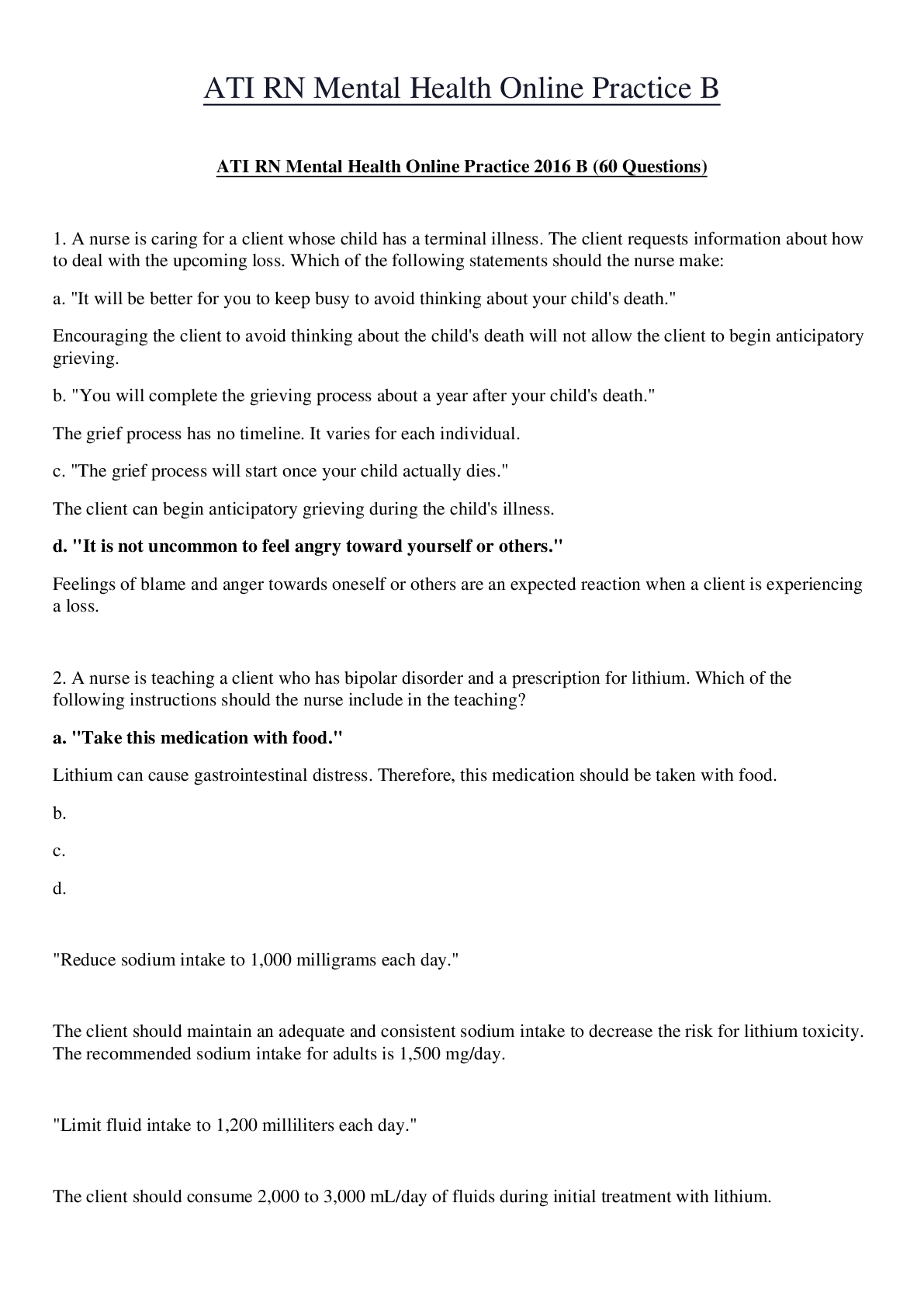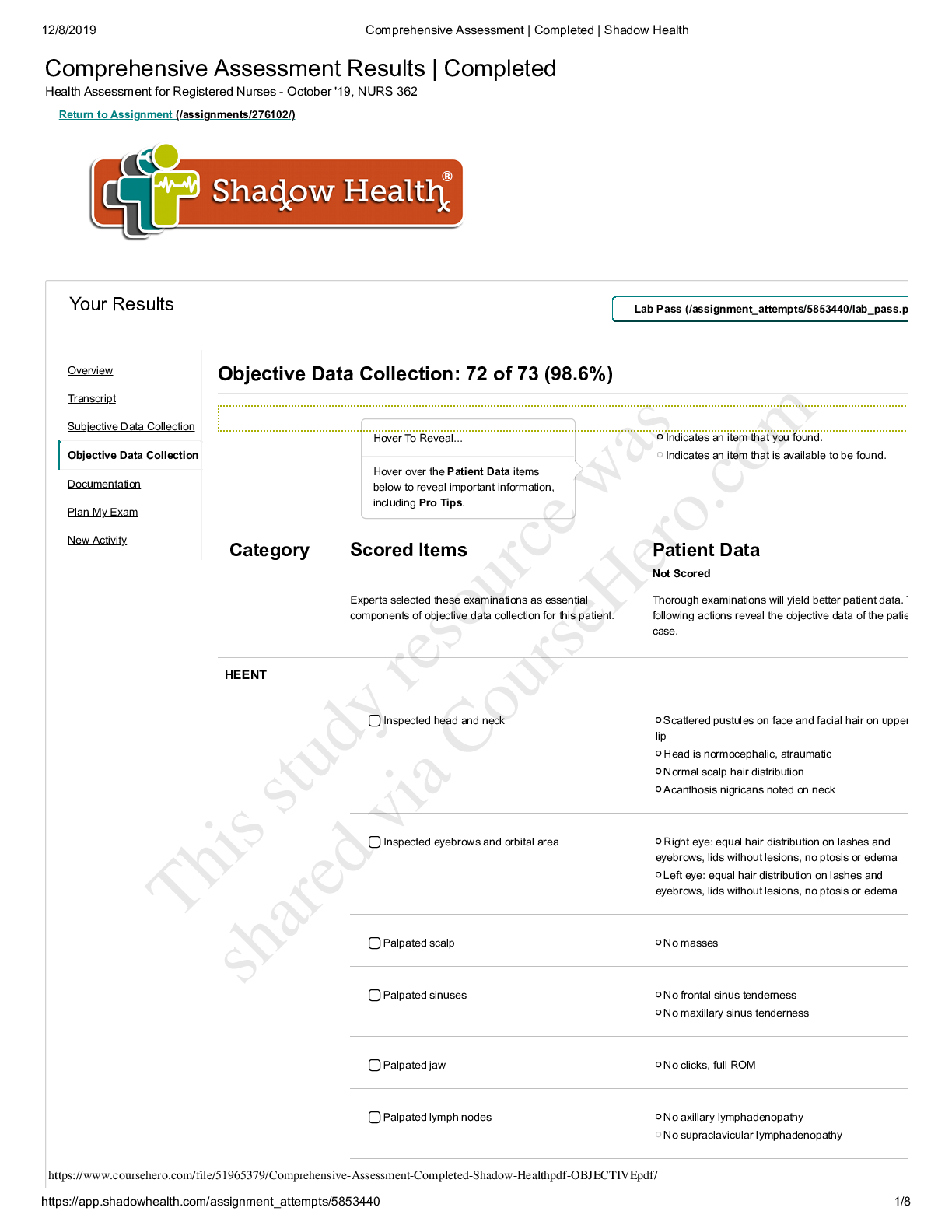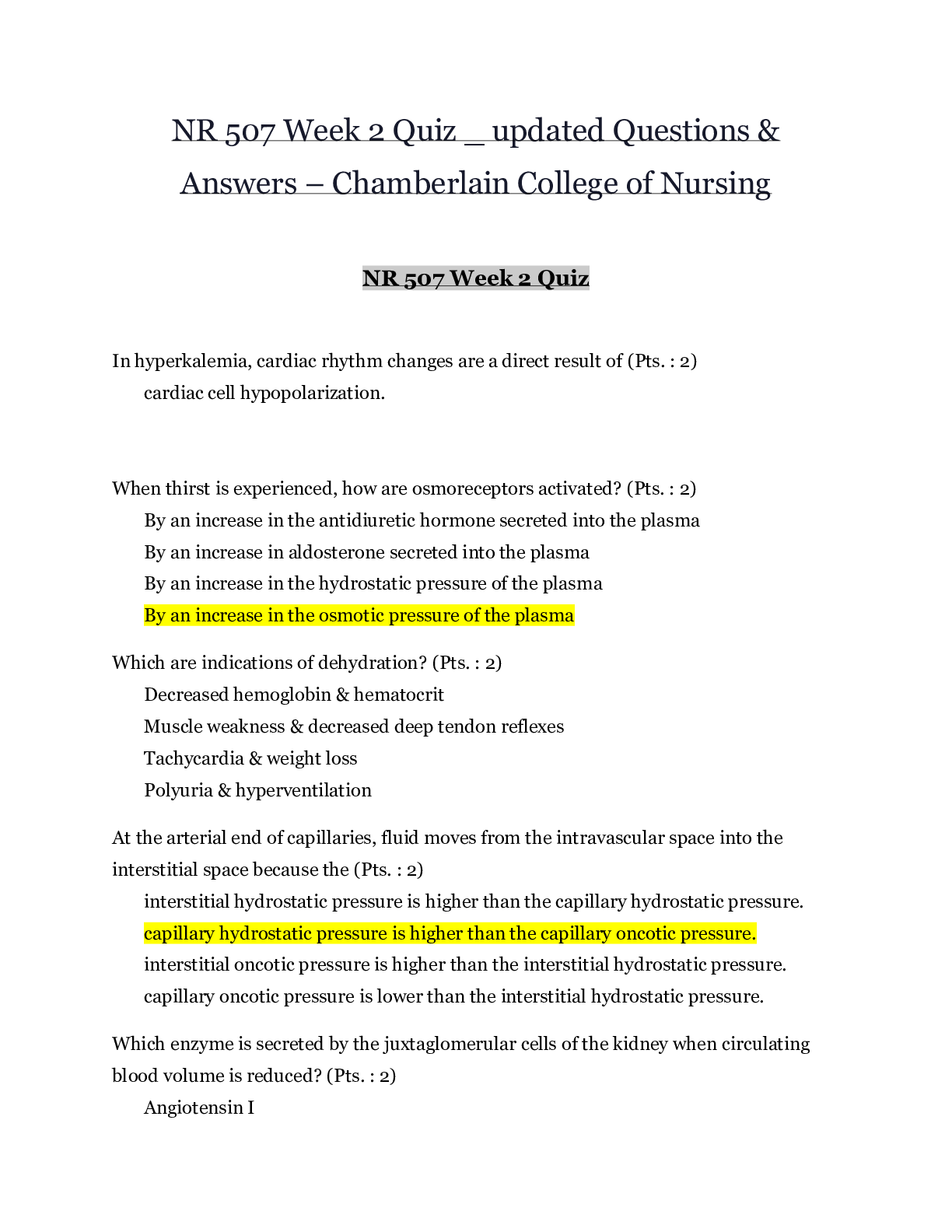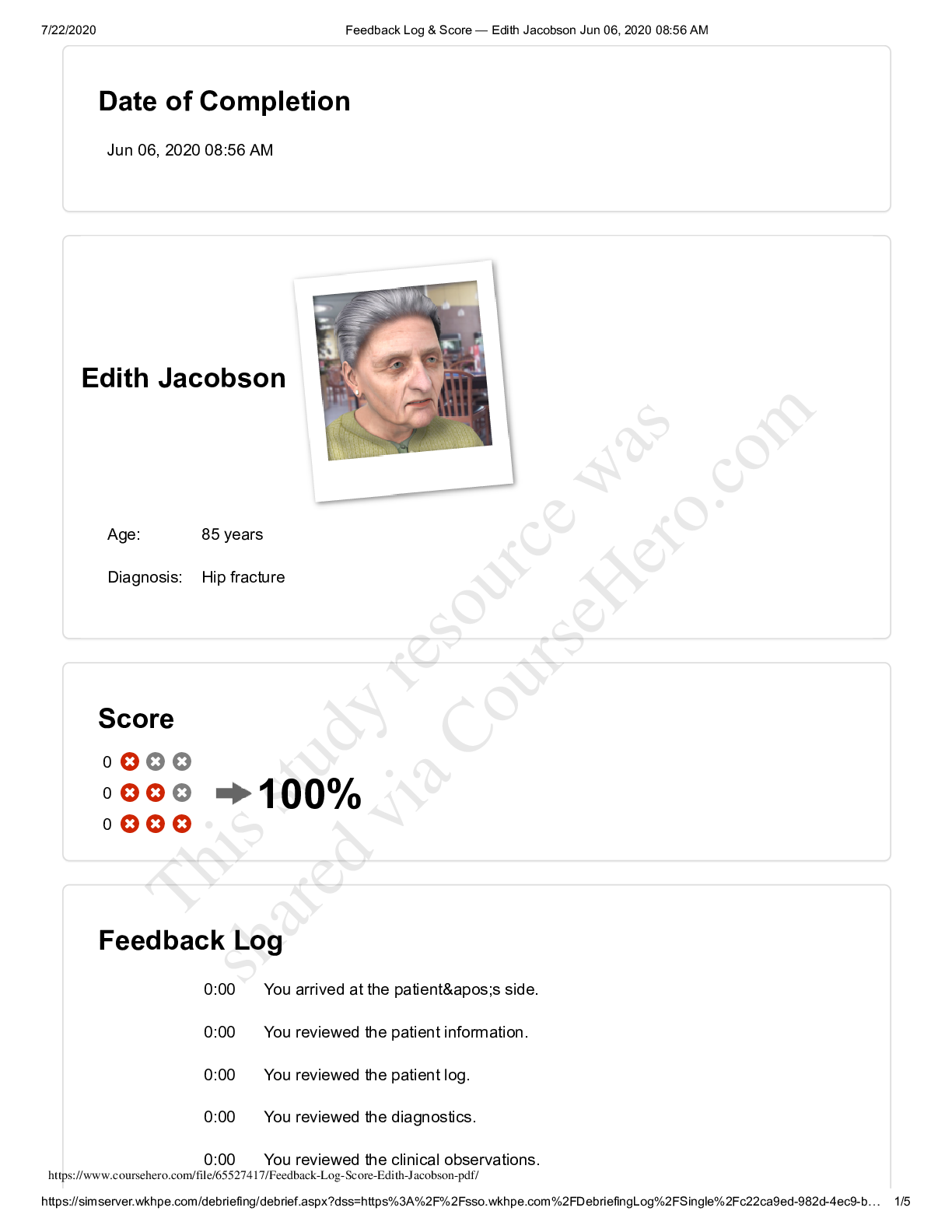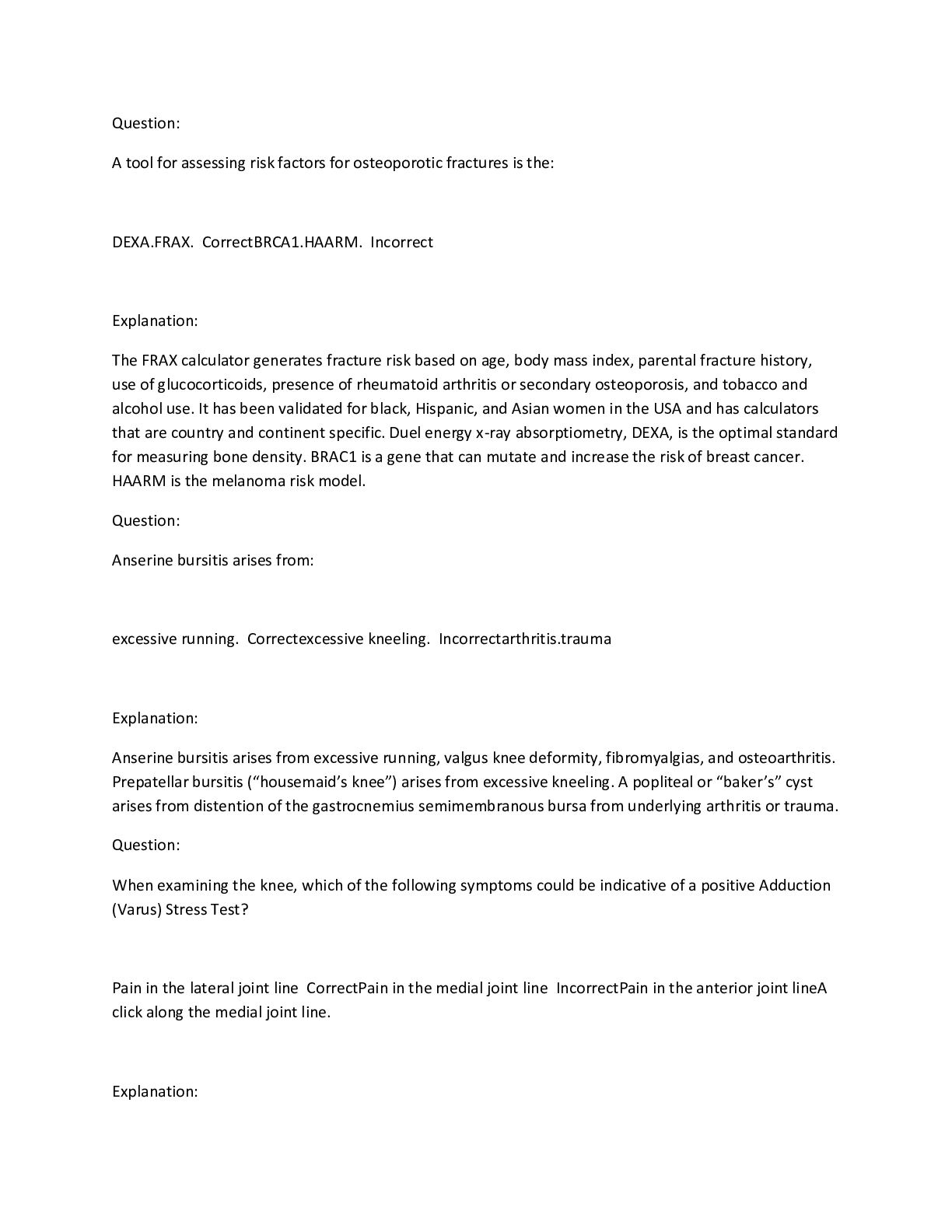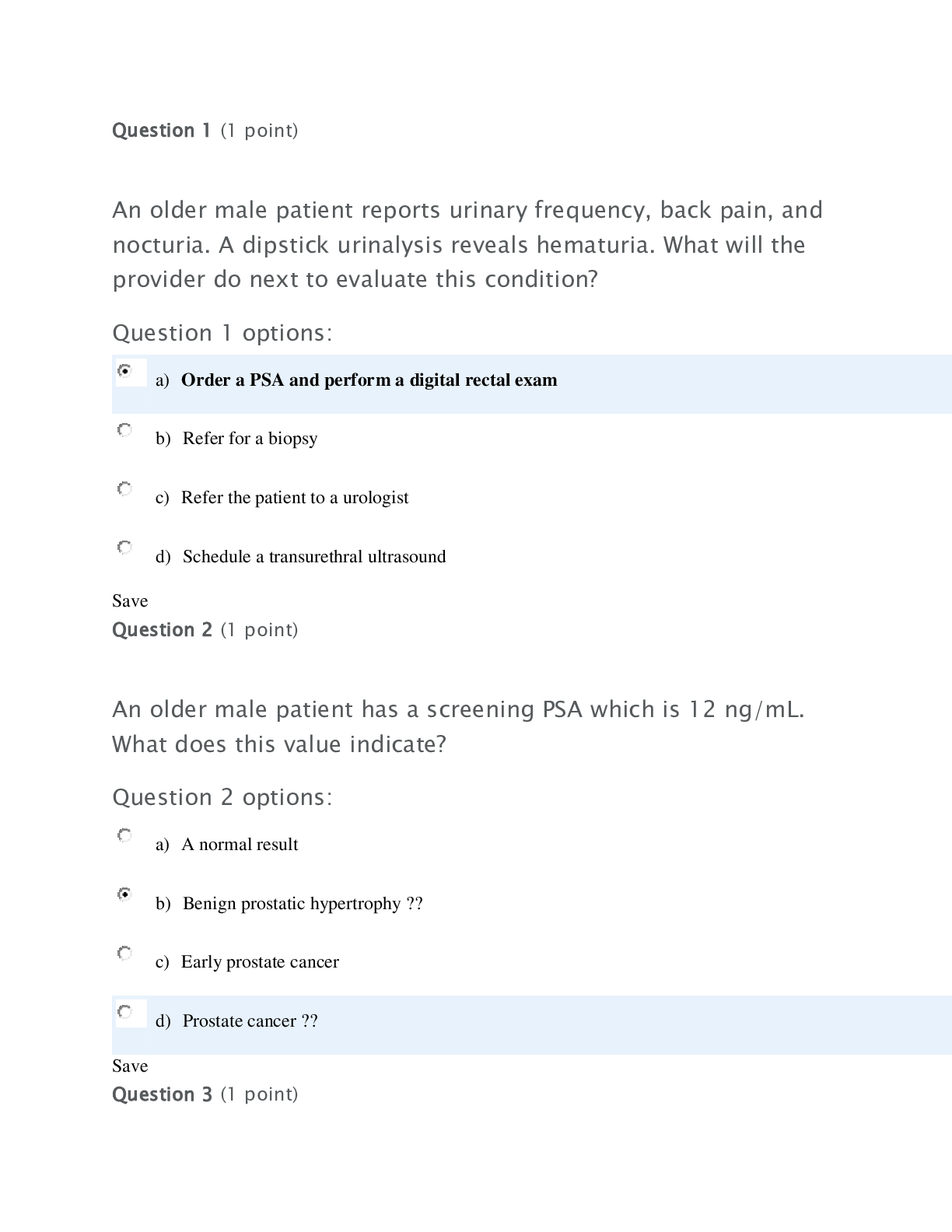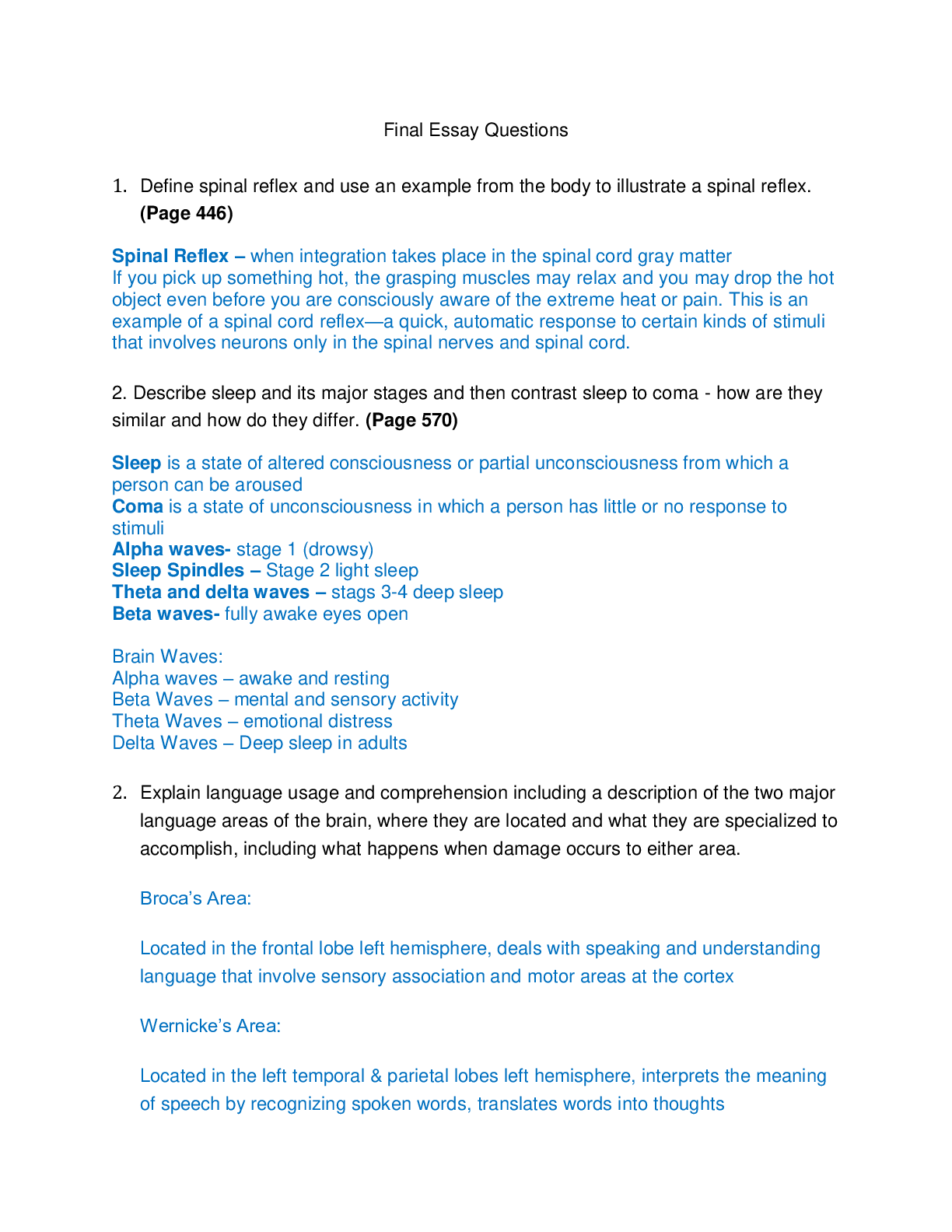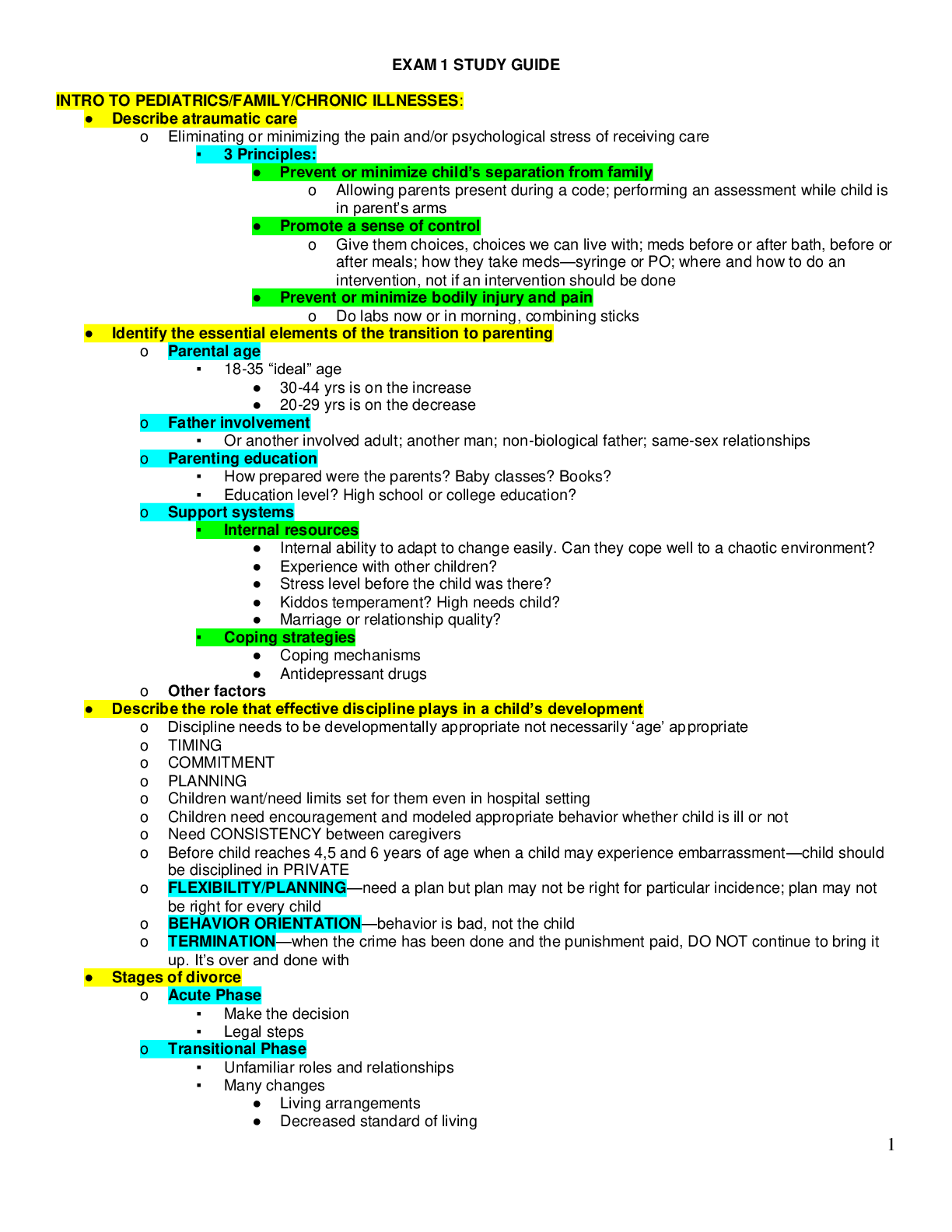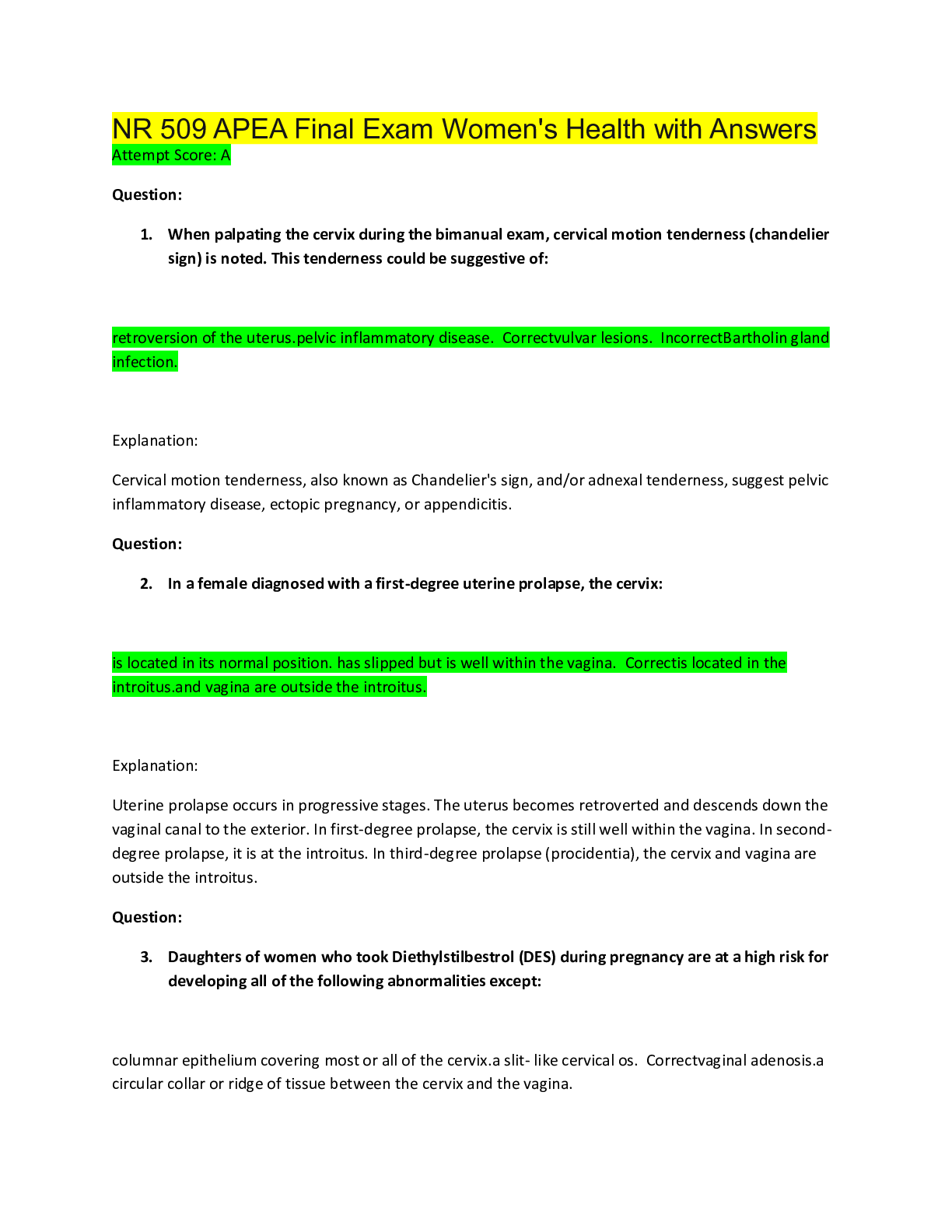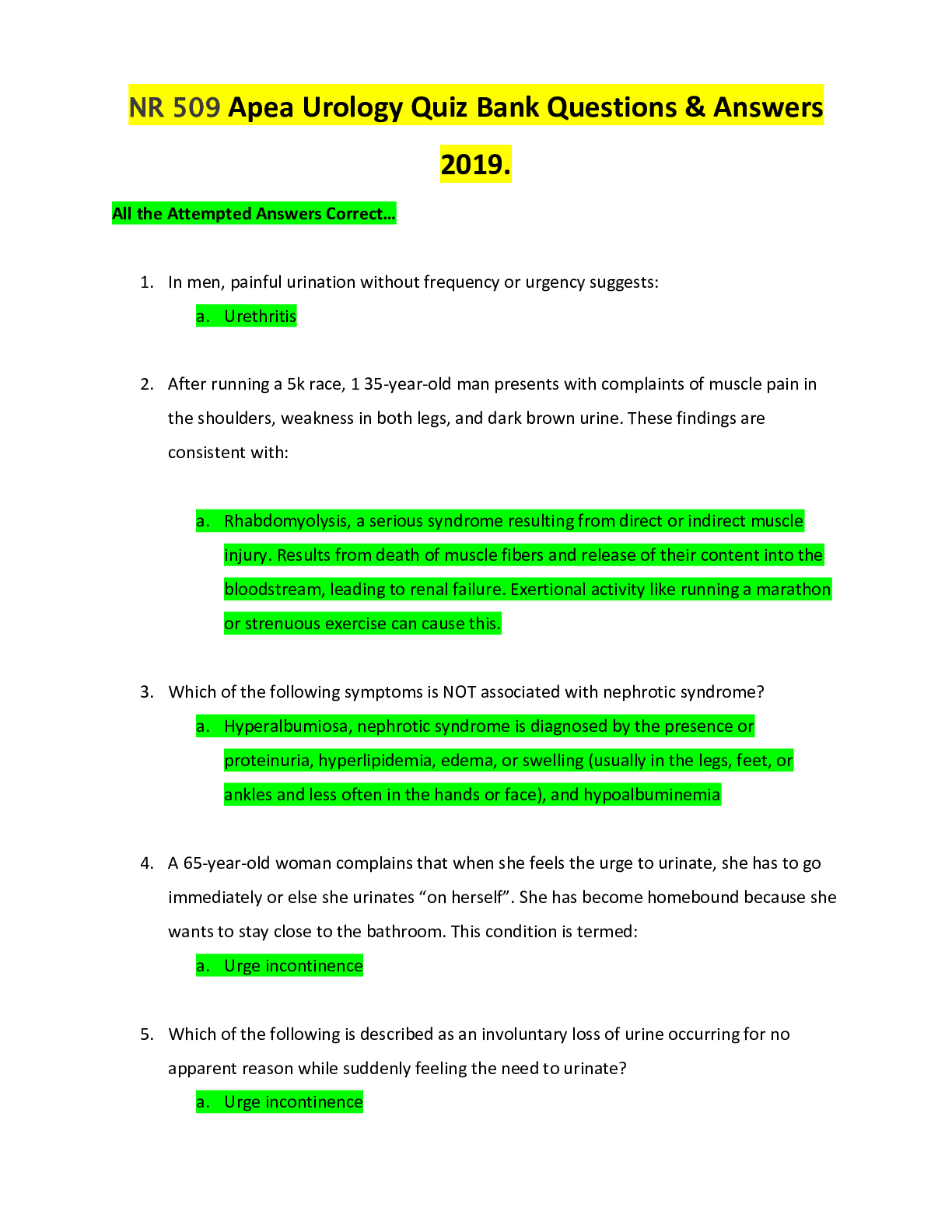*NURSING > EXAM > NR 511 Week 2 Quiz 2020 – Chamberlain College of Nursing (A grade) | NR 511 Week 2 Quiz 2020 – ( (All)
NR 511 Week 2 Quiz 2020 – Chamberlain College of Nursing (A grade) | NR 511 Week 2 Quiz 2020 – (A grade)
Document Content and Description Below
NR 511 Week 2 Quiz 2020 – Chamberlain College of Nursing (A grade) Week 2: Quiz Question 1 0 / 1 pts A 67-year old female on multiple medications for chronic conditions was just diagnosed wi... th gastroesophageal reflux disease (GERD). In teaching the patient about the disease, what medication should the clinician recommend that the patient refrain from using? Correct Answer Nonsteroidal anti-inflammatory drugs (NSAIDs). Oral contraceptives. Antibiotics. Antifungals. Clients with GERD should avoid taking NSAIDs because they tend to aggravate the already irritated gastric mucosa. Question 2 1 / 1 pts When the Weber test is performed with a tuning fork to assess hearing and there is no lateralization, the clinician should document this finding as: Correct! A normal finding. Perceptive deafness. Nerve damage. Conductive deafness. A Weber test assesses hearing by bone conduction. With normal hearing, sound is heard equally well in both ears, meaning there is no lateralization. Question 3 1 / 1 pts A 26-year-old male recently returned from a camping trip with symptoms of acute gastroenteritis. He reports that he only ate vegetables from his garden that he canned prior to his outing. Which of the following pathogens might be causing his symptoms? Staphylococcus. Campylobacter jejuni. Clostridium perfringens.orrect! Clostridium botulinum. C botulinum is an anaerobic, gram-positive bacillus that produces toxins. It is widely distributed in the soil and vegetation. Improperly processed home-canned low-acid vegetables and contaminated meats are the usual cause of food-borne botulism. Question 4 1 / 1 pts A 29-year-old female just returned from Central America with traveler’s diarrhea and presents to the clinic for evaluation. Which of the following is the best treatment? Metronidazole (Flagyl). Gastric lavage.orrect! Supportive care. Penicillin antibiotics. Enterotoxigenic Escherichia coli (ETEC) is the most common cause of traveler’s diarrhea, which occurs after ingesting contaminated food or water. It is usually self-limiting, requiring no treatment other than supportive care. It is common in developing countries. Traveler’s diarrhea caused by E coli used to be frequently treated with a 3- to 5-day course of a quinolone antibiotic, such as ciprofloxacin (Cipro). Question 5 1 / 1 pts A 75-year-old female presents to your office complaining of dizziness and ringing in both ears for 1 day. She describes the dizziness as feeling like "the room is spinning". On physical exam, the Rinne test reveals that air conduction is greater than bone conduction bilaterally. The Weber test reveals lateralization to the left. She is unable to hear the examiner's whisper on the right side but can hear the whisper on the left side. What is the next step in helping this patient’s symptoms? Refer the patient to the Emergency Room. Start her on high-dose Augmentinect! Start the patient on a low-salt diet, prescribe meclizine for vertigo and refer her to an ENT specialist. Order a computed tomography (CT) scan to rule out acoustic neuroma. Meniere's disease is characterized by vertigo, tinnitus and hearing loss. The patient self-reports vertigo and tinnitus while the results of the Weber, Rinne, and whisper test indicate sensorineural hearing loss on the right. Meniere disease is diagnosed based on history and the exclusion of other conditions as well. Referral to ENT is warranted to rule out other etiologies. The treatment for symptoms of Meniere disease is both dietary and pharmacological. Antibiotics are not indicated, nor is it necessary to send the patient to the Emergency Room. A CT scan would not help to relieve the patient's symptoms. UnansweredQuestion 6 0 / 1 pts In a young child, unilateral purulent rhinitis is most often caused by: A foreign body. An allergic reaction. A bacterial infection. A viral infection. In a young child, unilateral purulent rhinitis is most often caused by a foreign body. The key word here is unilateral. UnansweredQuestion 7 0 / 1 pts A 38-year-old male patient has recently had an ileostomy for ulcerative colitis. Which self-care measures should the clinician teach him about to relieve food blockage? Take a hot shower or tub bath. Lie in a supine position. Drink cold fluids. Massage the peristomal area. Self-care measures to relieve food blockage in a client with an ileostomy include massaging the peristomal area, which may stimulate peristalsis and fecal elimination; assuming a knee-chest position to reduce intra-abdominal pressure; taking a warm shower or tub bath to relax the abdominal muscles; and drinking warm fluids or grape juice to produce a mild cathartic effect. UnansweredQuestion 8 0 / 1 pts A 30-year-old male presents to the clinic with intermittent diarrhea. He is pretty sure that the antacids taken for heartburn are the cause since the loose stools always occur within 30 minutes after taking them. How should the clinician respond? “Antacids contain caffeine, which decreases bowel transit time.” “Antacids contain sorbitol or mannitol, which are sugars that aren’t absorbed and can cause fluid to be drawn into the bowel.” “Antacids contain fructose, which may not be totally absorbed, resulting in fluid being drawn into the bowel.” “Antacids may contain magnesium, which decreases bowel transit time and may contain poorly absorbed salts that draw fluid into the bowel.” Antacids may contain magnesium, which decreases bowel transit time and may contain poorly absorbed salts that result in an osmotic draw of fluid into the bowel resulting in diarrhea. UnansweredQuestion 9 0 / 1 pts A 52-year-old female is suspected of having a gastric ulcer and will undergo an Esophagogastroduodenoscopy (EGD). She is concerned because she heard that gastric ulcers can be malignant. How should the clinician respond? “Don’t worry. Gastric ulcers are not cancerous.” “You have about a 50% chance of having gastric cancer from your ulcer.” “Even if it is cancer, surgery is 100% successful.” “About 95% of gastric ulcers are benign.” About 95% of gastric ulcers are benign even though some of these seem to look malignant on x-ray. Question 10 1 / 1 pts Which medications used to treat nausea and vomiting works by affecting the chemoreceptor trigger zone, thereby stimulating upper gastrointestinal motility and increasing lower esophageal sphincter pressure? Anticholinergics, such as scopolamine (Donnatal). orrect! Antidopaminergic and cholinergic agents, such as metoclopramide (Reglan). Antidopaminergic agents, such as prochlorperazine (Compazine). Tetrahydrocannabinols, such as dronabinol (Marinol). Metoclopramide (Reglan) is used for diabetic gastroparesis and postoperative nausea and vomiting. It works by affecting the chemoreceptor trigger zone, thereby stimulating upper gastrointestinal motility and increasing lower esophageal sphincter pressure. Question 11 1 / 1 pts A 72-year-old male patient presents to the clinic for his annual physical. He states that he is worried because he only has a bowel movement every three days. How should the clinician respond? “You should have at least three stools per week.” “You should defecate once a day.” orrect! “There is no such thing as a ‘normal’ pattern of defecation.” “You should have two to three stools per day.” There is no such thing as a “normal” pattern of defecation. Patterns of defecation vary widely and may in part be affected by dietary habits, fluid intake, bacteria in the stool, psychological stress, or voluntary postponement of defecation. Defecating every third day could be the routine pattern for Simon. He should be questioned if this is routine for him. Question 12 1 / 1 pts Nausea is difficult to discern in a young child. What question should the clinician ask to determine if a child has nausea? “Are you nauseous?” “Are you sick to your tummy?” “Are you eating the way you normally eat?”orrect! “Are you hungry?” To elicit information concerning nausea in a young child, ask the child about hunger because a young child cannot usually differentiate between hunger and mild nausea. Question 13 1 / 1 pts The antibiotic of choice for recurrent acute otitis media (AOM) and/or treatment failure in children is: Correct! Amoxicillin and potassium clavulanate (Augmentin). Amoxicillin (Amoxil) Azithromycin (Zithromax). Prednisone (Deltasone). The antibiotic of choice for recurrent AOM or treatment failure is amoxicillin and potassium clavulanate (Augmentin). Question 14 1 / 1 pts A 21-year-old female patient presents to the clinic for pre-operative tonsillectomy clearance. She has heard about permanent taste changes after a tonsillectomy and is concerned. What should the clinician tell her? “Your ability to recognize sweet from salty taste will be altered for life.” “You will have some alterations, but we’ll have to wait and see how you are affected personally.”Correct! “You may notice a slight difference initially, but there are no lasting changes in taste.” “About half of the patients have some permanent alterations in the sense of taste.” Although some clients report a significant subjective drop in taste function following surgery, none have ongoing taste dysfunction. Question 15 1 / 1 pts An 82-year-old female has been diagnosed with irritable bowel, chronic constipation, and diverticulosis following a colonoscopy. Which pharmacological agent should the clinician recommend? Correct! Bulking agents. Stool softeners. Lubricants. Laxatives. Bulking agents, such as psyllium preparations or methylcellulose preparations, are used for irritable bowel, chronic constipation, and diverticulosis. Quiz Score: 10 out of 15 [Show More]
Last updated: 1 year ago
Preview 1 out of 8 pages
Instant download
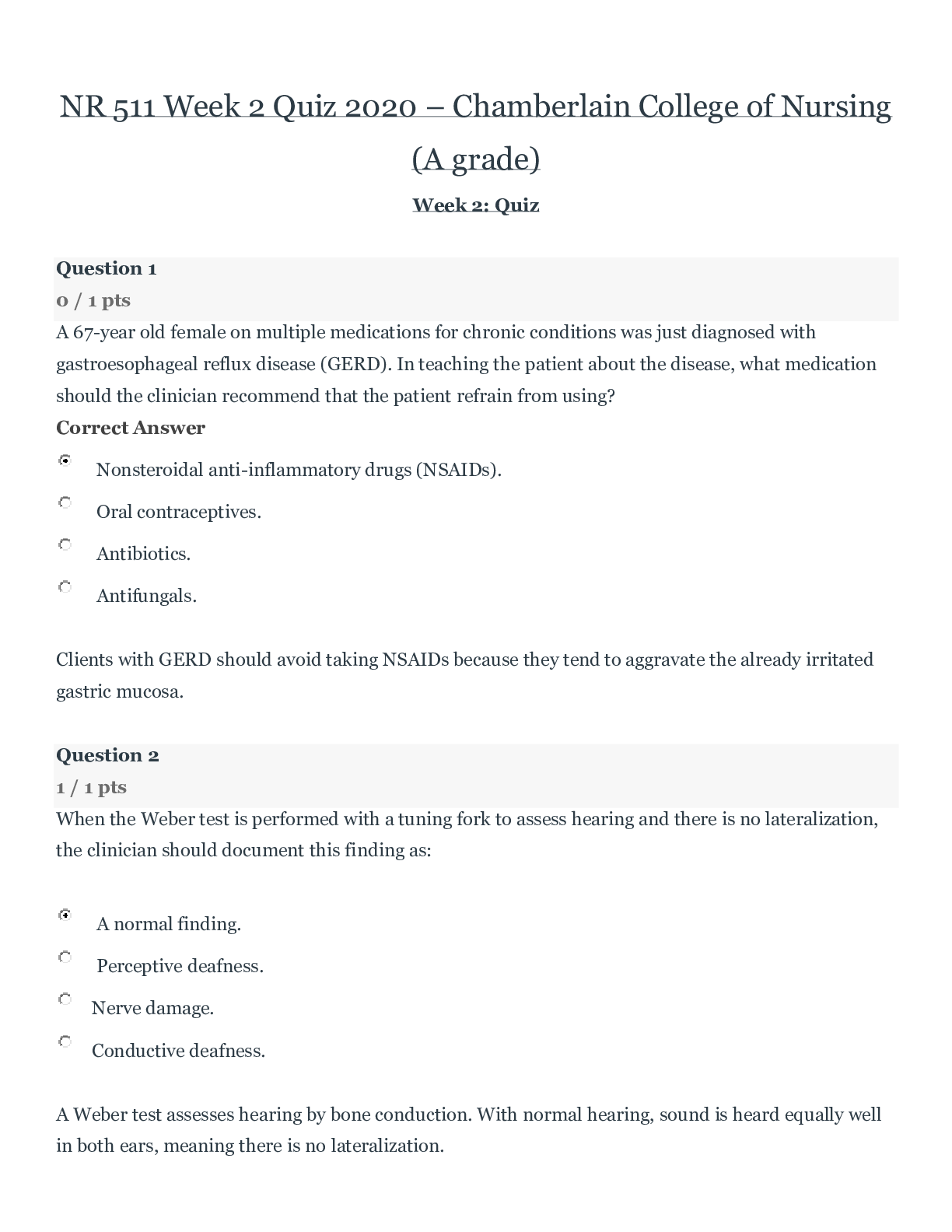
Buy this document to get the full access instantly
Instant Download Access after purchase
Add to cartInstant download
Reviews( 0 )
Document information
Connected school, study & course
About the document
Uploaded On
Jul 01, 2020
Number of pages
8
Written in
Additional information
This document has been written for:
Uploaded
Jul 01, 2020
Downloads
1
Views
156

